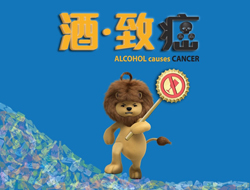NCD Watch
Alcohol Drinking and Cancer Risks
20 Dec 2021 (Mon)

The International Agency for Research on Cancer of the World Health Organization has classified alcohol as a Group 1 carcinogen (cancer-causing to humans), the same grouping as tobacco smoke, asbestos and ionising radiation. Alcohol consumption causes cancers of the oral cavity, pharynx, larynx, oesophagus, liver, colorectum, and female breast via various possible biological mechanisms.
All types of alcoholic beverages, including beer, wine (red or white), rice wine and spirits (such as brandy, whisky, gin, rum, vodka, tequila, etc.) can increase the risk of cancer. When it comes to cancer risk, there is NO safe level for alcohol consumption – the cancer risk starts to increase even with low levels of alcohol consumption. The higher the level of alcohol consumption or the longer the period of time consuming alcoholic beverages, the greater the risk of alcohol-associated cancers.
Refraining from alcohol use is thus one of the best cancer prevention methods. There is also good news for current drinkers: studies suggest that substantial cancer risk reduction could be seen in 5–10 years after cessation of alcohol drinking. Risk of cancer may further be reduced to that of a never-drinker after long-term cessation from alcohol drinking. So, it is never too late to stop drinking, and the sooner the better.
In Hong Kong, a telephone survey was conducted by the Department of Health (DH) in 2015 on 2 507 adults aged 18–64 about their knowledge, attitudes and practices pertaining to alcohol consumption. Results showed that 56.0% and 73.2% of the respondents agreed to the correct statements “alcohol can cause cancer” and “the risk of cancer increases with volume of drinking”, respectively. However, only less than two-fifths (36.5%) of the respondents agreed to the correct statement “regular alcohol drinking, even consumed in only small amount, increases the risk of cancer”.
To reinforce public awareness of the fact that alcohol causes cancer, DH is launching a publicity campaign for risk communication. DH also urges drinkers to appraise their drinking habits and appreciate the benefits of stopping alcohol consumption. They can answer the Alcohol and Health QuestionnaireThis link will open in a new window. Such simple, self-administered electronic questionnaire helps assess the drinkers’ alcohol use and potential health effects. For professional help, please consult your family doctor.
Source: NCD Watch December 2021This link will open in a new window






































